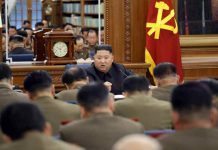It is predicted that with the North Korean authorities’ rejection of President Lee Myung Bak’s proposal to set up permanent liaison offices in Seoul and Pyongyang, the stalemate between the two Koreas will temporarily continue.
On the 26th, North Korea, through the publication of the Workers Party, the Rodong Shinmun, revealed its position for the first time regarding President Lee’s proposal. It criticized, “By avoiding the responsibility for the deterioration in North-South Korea relations, the proposal is a mere ploy to turn the attention of the public elsewhere.”
A North Korean state weekly, the Tongil (Reunification) Shinbo, spurned the South Korean proposal of liaison offices in its most recent issue (on April 26th), “His proposal merely resorts to word play.” North-South Korea relations cannot be merely resolved by setting up liaison offices. The path for improving North-South relations and for unification is applying and increasingly building on the Inter-Korea Summit Agreement, 2007 and the North-South Joint Declaration-June 15, 2000.”
The Blue House said regarding this on the 27th, “As long as the proposal does not concern a strategy on the North, it is not necessary to react to North Korea’s negative response.”
Lee Dong Kwan, the spokesperson for the Blue House, said in a document briefing on this day, “We conceived the idea of North-South Korean liaison offices with the objective that there has to be a perennial channel for a sincere and realistic dialogue and cooperation between the two Koreas.”
From the Blue House and the administration’s side, it has been known that they will observe the situation for some time. This is due to the fact that despite President Lee’s active messages, North Korea’s continuation of its offensive criticism will make it difficult to officially propose a dialogue to the North.
As a result, the administration seems to be waiting for an opportunity to open the gate of dialogue on the basis of continuing the effort in however way possible for a resumption in North-South Korea dialogue.
The North, through all kinds of propagandistic media, have poured out blunt criticisms one after the other, such as “rebel Lee Myung Bak,” “ignoramus,” “a political sleepwalker,” and “a half-wit.” President Lee, in response, recently appeared on a Japanese TV program and hinted at his more or less discomfort, saying, “Wouldn’t it cause discomfort to meet with North Korea, who calls me a rebel?”
Thus, the observation has been gaining weight that it will be not be easy for the administration to show an epochal gesture for resolving North-South Korea relations.
It has been anticipated that the possibility of President Lee’s proposal influencing an immediate change in North-South Korea relations would be low. Rather, it was observed that the offensive against the South, through propagandistic media, will be strengthened through slogans such as “Uriminzokkiri (Amongst Our Nation)” after the inauguration of President Lee.
The analysis of experts is that through a type of a battle of stamina, North Korea may try to test the Lee Myung Bak administration’s North Korea policy and to further disruption in the South Korea society.
Lee Dong Bok, the former representative to the Inter-Korea High-Level Talks, said during a phone conversation with the Daily NK on the 27th, “North Korea will temporarily continue its threat against the Lee Myung Bak administration. It will sabotage one-by-one the Inter-Korea dialogue apparatuses that are currently operating. It will stir up trouble in places like the Kaesong Industrial Complex and Mt. Geumgang and will only continue exchanges with pro-North Korea powers and will seek to excite the build-up of tension in the South.”
Furthermore, he added, “If the South holds onto its current position of building a new political situation in North-South Korea relations, there will be a stalemate of 3~6 months, but subsequently, there is possibility that the North will follow its pace and see its own position. By resigning to the temporary stalemate, we can prepare for a breakthrough within the year.”
In addition, North Korea’s recent emphasis on pursuing the implementation of the “June 15 Joint Declaration” and the “October 4 Agreement” should be observed.
The Rodong Shinmun stressed in an article on the 26th, “Through the June 15 Joint Declaration and the outline for its implementation, the October 4 Agreement, paths for a broad approach, dialogue, and cooperation between the North and the South across all areas such as politics, economics, the military, and culture have been prepared.”
The Shinmun also seemed to reflect an attitude of discomfort regarding The Lee Administration’s view to reevaluate the “October 4 Agreement.” In particular, its expression, “Paths for cooperation have (already) been prepared” is a confirmation of its view that other channels for dialogue are not needed, as long as the “Premier-level Talks” and the “Inter-Korea Economic Cooperation Joint Committee” exist within the framework of the “October 4 Agreement.”
It urged the continuation of agreements such as the Kim Dae Jung-Roh Moo Hyun administration’s North Korea policies and the fulfillment of the “October 4 Agreement.” Its message can be interpreted as a type of warning that unless these are kept, there cannot be dialogue between the North and the South.
If the Lee administration does not reveal subsequent measures such as the promise of fulfillment of the “October 4 Agreement,” the majority of experts predict that North-South Korea relations will maintain its status quo.




















